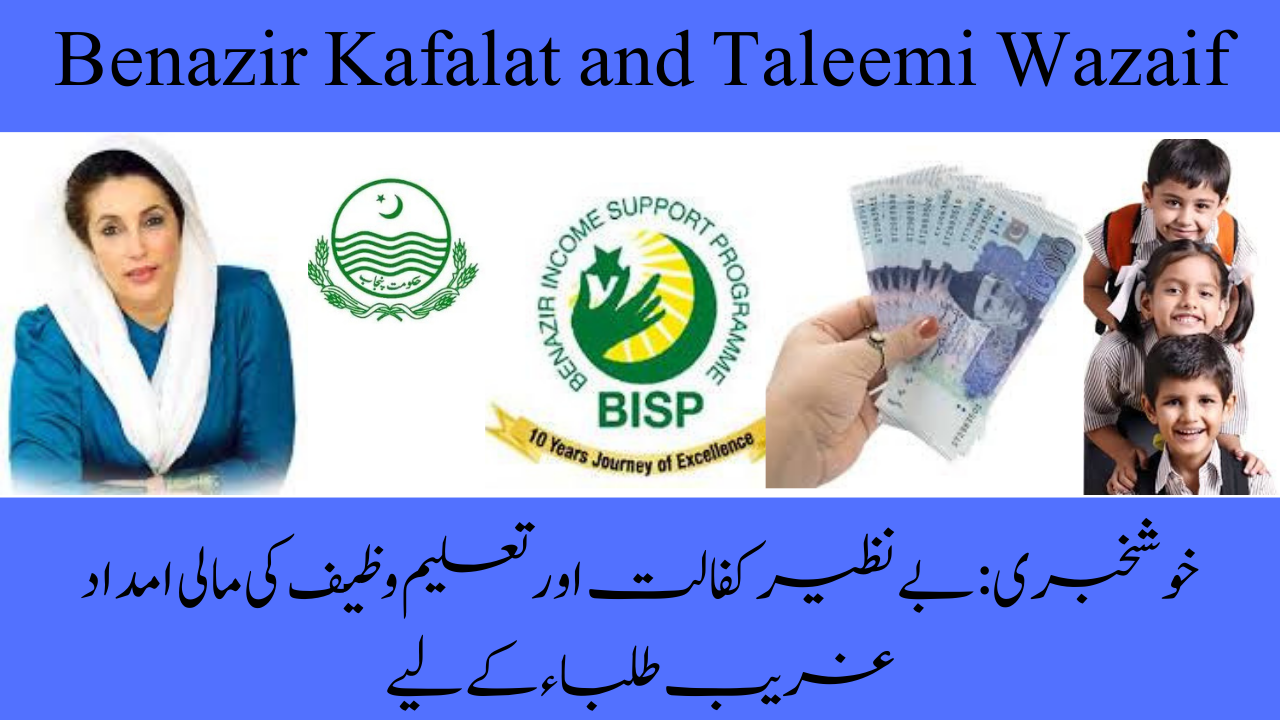Benazir Kafalat and Taleemi Wazaif
In a significant step towards uplifting underprivileged students, the Benazir Kafalat and Taleemi Wazaif financial aid programs have been announced. These initiatives are set to provide critical financial support to deserving students, ensuring they have access to education without the burden of financial constraints. The programs underscore the government’s commitment to education as a fundamental right and a cornerstone for national development.
Benazir Kafalat Program
The Benazir Kafalat Program is designed to provide financial assistance to the most vulnerable segments of society, including women, children, and the elderly. Under this program, eligible individuals receive a monthly stipend, which helps them meet their basic needs. The program aims to alleviate poverty and promote social inclusion by ensuring that the benefits reach the most disadvantaged groups.
The recent expansion of the Benazir Kafalat Program includes a specific focus on education. Recognizing that many children from low-income families are unable to attend school due to financial barriers, the program now provides additional stipends to families with school-going children. This initiative aims to reduce dropout rates and encourage continuous education among children from disadvantaged backgrounds.
Taleemi Wazaif Program
The Taleemi Wazaif Program is a scholarship initiative targeted at underprivileged students. It aims to provide financial support to students at different educational levels, from primary school to higher education. The scholarships cover various expenses, including tuition fees, books, and other educational materials, as well as transportation costs for students who need to travel long distances to attend school.
One of the key features of the Taleemi Wazaif Program is its focus on merit and need. Scholarships are awarded based on academic performance and financial need, ensuring that the most deserving students receive the support they need to pursue their education. The program also places a special emphasis on girls’ education, aiming to close the gender gap in education and empower young women through learning.
Implementation and Impact
The implementation of these programs involves a multi-faceted approach, including community outreach, school partnerships, and digital platforms to ensure transparency and efficiency. The government collaborates with local schools and community organizations to identify eligible students and families. Additionally, digital platforms are used for application submissions and disbursement of funds, reducing the risk of corruption and ensuring timely delivery of assistance.
The impact of these programs is expected to be significant. By providing financial support to underprivileged students, the Benazir Kafalat and Taleemi Wazaif programs aim to increase school enrollment and attendance rates. This, in turn, is expected to improve literacy rates and educational outcomes, contributing to long-term economic and social development.
In the short term, the financial aid will help families meet their immediate needs, reducing the pressure on children to drop out of school to support their families. In the long term, education is expected to provide these students with better job opportunities, breaking the cycle of poverty and contributing to a more educated and skilled workforce.
Challenges and Solutions
Despite the positive impact, the programs face several challenges. One of the primary challenges is ensuring that the benefits reach the most remote and marginalized communities. To address this, the government is working on expanding its outreach efforts and using mobile technology to reach students in remote areas. Additionally, there is a need for continuous monitoring and evaluation to ensure the effectiveness of the programs and to make necessary adjustments based on feedback and changing needs.

Another challenge is maintaining the quality of education in schools. Financial support alone is not enough if the quality of education remains poor. Therefore, the government is also focusing on improving the quality of education by investing in teacher training, infrastructure development, and curriculum enhancement.
The Way Forward
Looking ahead, the success of the Benazir Kafalat and Taleemi Wazaif programs will depend on sustained commitment from the government, active participation from the community, and continuous improvement based on feedback and evaluation. The programs represent a holistic approach to addressing the educational needs of underprivileged students, combining financial support with efforts to improve the overall quality of education.
The government is also exploring partnerships with private sector organizations and international donors to expand the reach and impact of these programs. Collaborative efforts can bring in additional resources, expertise, and innovative solutions to enhance the effectiveness of the initiatives.
In conclusion, the Benazir Kafalat and Taleemi Wazaif financial aid programs are a beacon of hope for underprivileged students in Pakistan. By addressing the financial barriers to education, these programs are paving the way for a brighter future for thousands of children. As the programs continue to evolve and expand, they hold the promise of transforming lives and contributing to the overall development of the nation.
